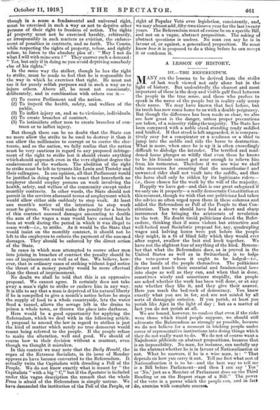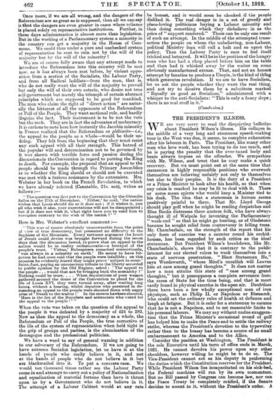A LESSON OF HISTORY.
III.—THE REFERENDUM.
MANY are the lessons to be derived from the strike of last week viewed not only alone but in the light of history. But undoubtedly, the clearest and most important of these is the deep and visible gulf fixed between the people in the true sense, and those who profess to speak in the name of the people but in reality only usurp their name. We may have known that fact before, but its truth has now come home to us with a double poignancy. But though the difference has been made so clear, we also see how great is the danger, unless proper precautions are taken, of a minority riding themajority. The State has been compared with a noble steed standing ready saddled and bridled. If that steed is left unguarded, it is compara- tively easy for a conspirator or a madman or a thief to jump into the saddle and ride the horse to destruction. What is more, when once he is up it is often exceedingly difficult to dislodge the intruder. The terrified and mad- dened horse plunges so wildly that even those he knows to be his friends cannot get near enough to relieve him from his tormentor. Therefore if we are wise we shall take measures for ensuring that the unauthorized and unwanted rider shall not vault into the saddle, and that the horse shall only be ridden by its legitimate riders- i.e., those chosen for the work by the will of the majority. Happily we have got—and that is our great safeguard if we only use it properly—a really democratic Constitution at this moment, though we wish that our politicians had taken the advice so often urged upon them in these columns and added the Referendum or Poll of the People to that Con- stitution. Then we should have had a short and sharp instrument for bringing the aristocrats of revolution to the test. No doubt timid politicians dread the Refer- endum, thinking that if some violent but attractive and well-baited mad Socialistic proposal for, say, quadrupling wages and halving hours were put before the people they might, in a fit of blind folly which they would ever after regret, swallow the bait and hook together. We have not the slightest fear of anything of the kind. Remem- ber that what the Referendum does, as is proved in the United States as well as in Switzerland, is to lodge the veto-power where it ought to be lodged—i.e., in the hands of the people themselves. The politicians discuss and knock their essential and fundamental laws into shape as well as they can, and when that is done, sometimes wisely and sometimes stupidly, the people are asked whether the work has been well done, or at any rate whether they like it, and they give their answer. Here you reach the bed-rock of democracy. You know exactly what you are in for, and are not misled by all sorts of demagogic outcries. If you perish, at least you perish like Ajax in the light of day ; but as a matter of fact you do not perish at all. We are bound, however, to confess that even if the risks were those which timid people suppose, we should still advocate the Referendum as strongly as possible, because we do not believe for a moment in tricking people under cover of representative institutions into doing things which they do not really want to do. We do not of course want a Napoleonic plebiscite on abstract propositions, because that is an impossibility. No man, for instance, can usefully say in the abstract whether he is in favour of Nationalization or not What be answers, if he is a wise man, is : " That depends on how you carry it out. Tell me first what sort of Nationalization it is to be—and the best way to tell me is a Bill before Parliament—and then I can say ' Yes' or 'No,' just as a Member of Parliament does on the Third Reading or on the Report stage of a Bill." The power of the veto is a power which the people can, and in fad do, exercise with complete success. Once more, if we are all wrong, and the dangers of the Referendum are as great as is supposed, then all we can:say Is that the dangers are even greater in cases where reliance is placed solely on representative institutions. Further, in these days administration is almost more than legislation. But lathe working of a Parliamentary system:a minority in the country can get a majority in the House of Com- mons. We could thus under a pure and unchecked system of representation be sent to ruin not by the. will of the majority but by the will of the minority 1 We are of course fully aware that any attempt made to Introduce the Referendum into this country will be met now, as it has always been • met before, by violent oppo- sition from a section of the Socialists, the Labour Party, and from all Radical faddists fromthe men, that is, who do not really want the will of the majority to prevail but only the will of their own coterie, who desire not true self-government but merely the triumph of certain abstract principles which are supposed to be good for mankind. The men who claim the right of "direct action" are natur- ally the bitterest of all the opponents of the Referendum or Poll of the People. They want sectional rule, and hardly disguise the fact. Their instrument is to be not the vote but the mob. They are in fact the advocates of mobocracy. It is curious to note here how instantly the Jacobin minority in. France realized that the Referendum or plibiscite--i.e., the appeal to the people as a whole—would be their un-
doing. They felt from the beginning that they must resist any such appeal with all their strength. This hatred of the popular will and determination not to be governed by it was shown with terrible force and passion during the discussions in the Convention in regard to putting the King to death. For example, the proposal that an appeal to the people should be made through the Primary Assemblies as to whether the King should or should not be executed was met with a furious resistance by the extremists. Mrs. Webster in her book on the French Revolution, to which we have already referred (Constable, 21s. net), writes as follows " The question was first put to the, Convention by the Girondin Belles on the 27th of December. Either,' .he said, the nation wishes that Louis should die or it does not ; if it wishes it, you all who wish it also, your expeotations will not be disappointed ; but if it does not wish it, what right have you -to send him to execution contrary to the wish of the nation ? ' " Here is Mrs. Webster's excellent comment :— " This was of course absolutely unanswerable from the point of view of true democracy, but presented no difficulty to the Sophists of the Mountain. Every tortuous argument the heart of Jesuit could devise was brought -forward during the seven days that the discussion lasted, to prove that an appeal to the nation would be in reality undemocratic--a betrayal of the people's trust. ' Virtue,' Robespierre remarked sententiously, was always in .a minority on earth.' He seems to have for- gotten he had once said that the people were infallible ; on this occasion he evidently leered they might prove' subject to error.' Saint-Just,paying an unconscious tribute to the liberty accorded to public opinion by the Old Regime, asked : The appeal to the people .. . would that not'be bringing back the monarchy ? ' Nothing could be truer. . . . When deputations of poor women gathered .around -the doors of the Convention to plead for the life of Louis XVI. they were turned away, after waiting long hours, without a hearing, whilst deputies who persisted in de- manding an appeal to the people were shouted down with angry cries of • Death to the traitor ! ' In the streets hawkers.shouted, Here is the list .of the Royalists and aristocrats who -voted for the appeal to the people V " When the vote was taken on the question of the appeal to the people it was defeated by a majority of 424 to 283. Now as then the appeal to the democracy as a whole, the Referendum or Poll of the People, the true corrective of the ills of the system of representation when held tight in the grip of groups and parties, is the abomination of the demagogue and the professional politician.
We have a word to say of general warning in addition to our advocacy of the Referendum. If we are going to have extreme Socialist legislation, let us have it at the. hands of people who really believe in it, and not at the hands of people who do not believe in it but are blackmailed into it. To put a concrete case. We would ten thousand times rather see the Labour Party come in and attempt to carry out a policy of Nationalization and equalisation of material fortune than have it thrust upon us by a Government who do not believe in it. The attempt of a Labour Cabinet would at any rate be honest, and it would soon he cheeked- if the people disliked it. The real :danger is. in ta set of greedy and place-loving politicians buying a Labour minority and then doing something which they disbelieve in as the price of " support rendered." There can be only one result of such an attempt. In the.middle of the attempted trans- action the people on whom the unbelieving, non-Labour, political Ministry lean will call a halt and so upset the policy. Then the Labour Party is sure to feel itself tricked and betrayed. It willbe in the position of the hungry man who has had a chop placed before him on the table and then had it whisked away by the waiter on some obviously manufactured excuse. That, and not an ,honest attempt by fanatics to produce a Utopia, is the kind of thing which generates revolution. If we are to have Socialism, let us ask the people whether they want the real thing, and not try to deceive them by a substitute marked " Equally as good as Socialism," administered with a whisper to the 'anti-Socialists " This is only a fancy dope ; there is no real stuff in it."
(Conclusion.) .



































 Previous page
Previous page